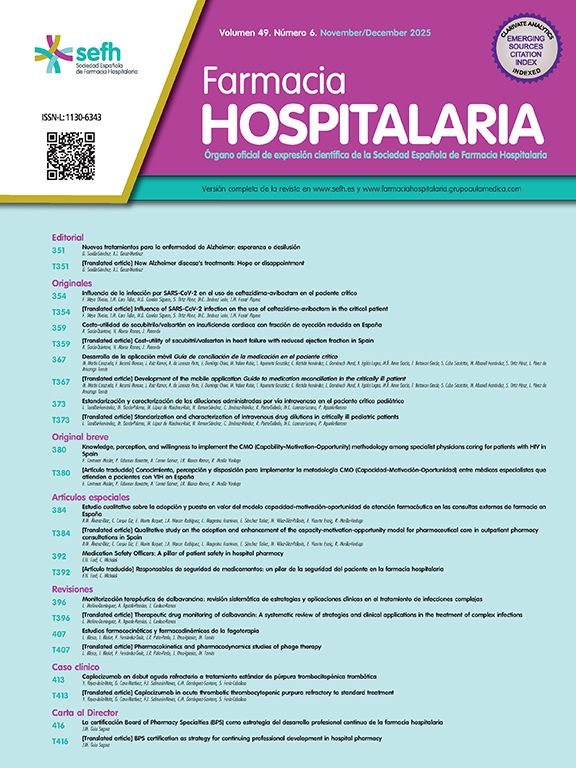Assessing the effectiveness and safety of natalizumab for treating relapsing-remitting multiple sclerosis in a tertiary hospital.
MethodObservational, prospective study of adult patients treated with natalizumab from May 2007 until February 2009. Treatment: 300mg natalizumab every four weeks. Response criteria: assessment of disease progression, appearance of flare-ups and assessment of magnetic resonance images. Adverse reactions during treatment with natalizumab were recorded.
ResultsThirty patients (73% female); average age 34±8.4 years; mean baseline EDSS 3.4±1.3; number of flare-ups in the past year 2.1±1.2. Treatment was discontinued in five patients, due to refusal in one case, ineffectiveness in two cases and anaphylaxis in the other two cases. Fourteen patients completed one year of treatment with satisfactory results. A lower EDSS score by 36%, 47%, 31%, 54% and 28% was obtained at 3, 6, 9, 12 and 15 months of treatment respectively. The prevalence of relapse-free patients was 94%, 76% and 54% at 3, 6 and 12 months. MRI imaging studies in 11 patients one year after they began treatment showed no new lesions. Two patients suffered severe anaphylactic shock and another one had an outbreak of urticaria. The presence of neutralising antibodies was the reason for suspending treatment in 6.6% of the patients.
ConclusionsThe treatment's effectiveness and safety in our patient group suggest that natalizumab is a treatment for refractory patients or those with aggressive types of multiple sclerosis, although we do not yet know about its long-term effects and the evolution of the appearance of neutralising antibodies.
Evaluar la efectividad y la seguridad del natalizumab en el tratamiento de la esclerosis múltiple remitente recidivante en un hospital de tercer nivel.
MétodoEstudio observacional, prospectivo, de los pacientes adultos tratados con natalizumab desde mayo de 2007 hasta febrero de 2009. Tratamiento: natalizumab 300mg cada cuatro semanas. Criterio de respuesta: valoración de la progresión de la enfermedad, aparición de brotes y evaluación de imágenes mediante resonancia magnética. Se han recogido las reacciones adversas durante el tratamiento con natalizumab.
ResultadosTreinta pacientes (el 73% eran mujeres); promedio de edad: 34±8,4 años; escala expandida del estado de discapacidad medio basal: 3,4±1,3, y número de brotes en el último año: 2,1±1,2. Cinco pacientes suspendieron el tratamiento, uno por abandono del tratamiento, dos por ineficacia y dos por reacciones anafilácticas. Catorce pacientes completaron un año de tratamiento con resultados satisfactorios. Se obtuvieron reducciones de la escala expandida del estado de discapacidad del 36, el 47, el 31, el 54 y el 28% a los 3, los 6, los 9, los 12 y los 15 meses de tratamiento, respectivamente. La prevalencia de pacientes libres de recidiva fue del 94, el 76 y el 54% a los 3, los 6 y los 12 meses, respectivamente. Las imágenes de resonancia magnética al año de tratamiento correspondientes a 11 pacientes no mostraron nuevas lesiones. Dos pacientes sufrieron reacciones anafilácticas graves y otro sufrió una reacción urticarial. Un 6,6% de los pacientes presentó anticuerpos neutralizantes que motivaron la suspensión del tratamiento.
ConclusionesLa efectividad y la seguridad obtenidas en nuestros pacientes sugieren que el natalizumab constituye una alternativa para los pacientes refractarios o con formas agresivas de esclerosis múltiple, aunque falta conocer los efectos a largo plazo y la evolución de la aparición de anticuerpos neutralizantes.
Part of this study was presented at the 53rd Conference of the Spanish Society of Hospital Pharmacy, held in Valencia on 21–24 October 2008.






